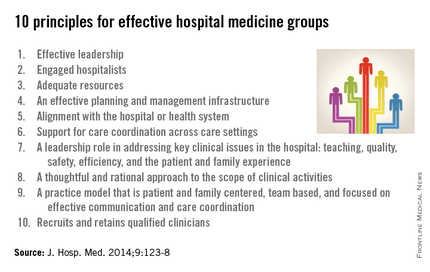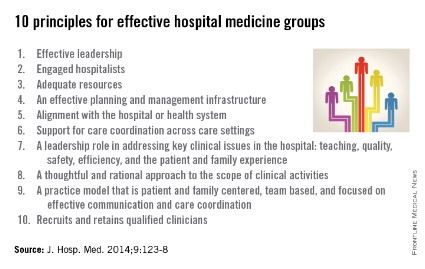User login
The Society of Hospital Medicine has come up with 10 "basic ingredients" for building and sustaining an effective hospital medicine group.
The list of guiding principles, which was published in the Journal of Hospital Medicine, is meant to help hospital medicine groups perform self-assessments and set goals for improvement, while also providing hospital executives with benchmarks for evaluating those groups. (J. Hosp. Med. 2014;9:123-8).

The 10 principles and 47 key characteristics of an effective hospital medicine group address everything from adequate staffing to the scope of clinical activities for the hospitalist.
The biggest challenge in creating the document was identifying characteristics that could apply to all types of hospital medicine groups, given the diversity in practice settings, employment models, and patient populations in hospital medicine, said Dr. John Nelson, a coauthor of the document and cofounder of the Society of Hospital Medicine (SHM).
But it won’t be a perfect fit for everyone, he said. "It’s a little bit like a roadmap for leading a good life," he said. "You put on exercise and eating well and things of that sort, but there are lots of people that have different circumstances."
In the document, the SHM workgroup suggested that the principles and characteristics could be used in variety of ways. For instance, they could be used as a framework for hospital medicine groups and hospital leaders to discuss ongoing issues. They could also be used more formally to guide planning and budget activities for the hospital medicine group. Or hospital leaders could use them to evaluate hospital medicine groups, by calling on them to address 80% of the 47 characteristics, for example.
Dr. Nelson, who is the medical director of the hospitalist medicine group at Overlake Hospital in Bellevue, Wash., and a practice management consultant, said the most important thing is that the list is not ignored.
Spend 20 minutes using the list to grade the group’s performance, he said, and then have other physicians do the same and compare the results.
"It’s a good exercise to think about how your practice is doing, compared with what a large group of people think might be the best way to approach things," Dr. Nelson said.
But the document’s authors admitted that there could be a downside to the publication of the principles. Hospital medicine groups could be held accountable for meeting these criteria without getting the necessary financial support from their hospitals.
"The idea is to encourage good performance," Dr. Nelson said. "No group is doing them all and to use this simply as a tool of punishment will not advance the cause much."
The list of principles and characteristics was created over 18 months by a workgroup of experts selected by the SHM board of directors. The document was also reviewed by focus groups of hospitalists and by health care experts outside of the field of hospital medicine.
On Twitter @maryellenny
The Society of Hospital Medicine has come up with 10 "basic ingredients" for building and sustaining an effective hospital medicine group.
The list of guiding principles, which was published in the Journal of Hospital Medicine, is meant to help hospital medicine groups perform self-assessments and set goals for improvement, while also providing hospital executives with benchmarks for evaluating those groups. (J. Hosp. Med. 2014;9:123-8).

The 10 principles and 47 key characteristics of an effective hospital medicine group address everything from adequate staffing to the scope of clinical activities for the hospitalist.
The biggest challenge in creating the document was identifying characteristics that could apply to all types of hospital medicine groups, given the diversity in practice settings, employment models, and patient populations in hospital medicine, said Dr. John Nelson, a coauthor of the document and cofounder of the Society of Hospital Medicine (SHM).
But it won’t be a perfect fit for everyone, he said. "It’s a little bit like a roadmap for leading a good life," he said. "You put on exercise and eating well and things of that sort, but there are lots of people that have different circumstances."
In the document, the SHM workgroup suggested that the principles and characteristics could be used in variety of ways. For instance, they could be used as a framework for hospital medicine groups and hospital leaders to discuss ongoing issues. They could also be used more formally to guide planning and budget activities for the hospital medicine group. Or hospital leaders could use them to evaluate hospital medicine groups, by calling on them to address 80% of the 47 characteristics, for example.
Dr. Nelson, who is the medical director of the hospitalist medicine group at Overlake Hospital in Bellevue, Wash., and a practice management consultant, said the most important thing is that the list is not ignored.
Spend 20 minutes using the list to grade the group’s performance, he said, and then have other physicians do the same and compare the results.
"It’s a good exercise to think about how your practice is doing, compared with what a large group of people think might be the best way to approach things," Dr. Nelson said.
But the document’s authors admitted that there could be a downside to the publication of the principles. Hospital medicine groups could be held accountable for meeting these criteria without getting the necessary financial support from their hospitals.
"The idea is to encourage good performance," Dr. Nelson said. "No group is doing them all and to use this simply as a tool of punishment will not advance the cause much."
The list of principles and characteristics was created over 18 months by a workgroup of experts selected by the SHM board of directors. The document was also reviewed by focus groups of hospitalists and by health care experts outside of the field of hospital medicine.
On Twitter @maryellenny
The Society of Hospital Medicine has come up with 10 "basic ingredients" for building and sustaining an effective hospital medicine group.
The list of guiding principles, which was published in the Journal of Hospital Medicine, is meant to help hospital medicine groups perform self-assessments and set goals for improvement, while also providing hospital executives with benchmarks for evaluating those groups. (J. Hosp. Med. 2014;9:123-8).

The 10 principles and 47 key characteristics of an effective hospital medicine group address everything from adequate staffing to the scope of clinical activities for the hospitalist.
The biggest challenge in creating the document was identifying characteristics that could apply to all types of hospital medicine groups, given the diversity in practice settings, employment models, and patient populations in hospital medicine, said Dr. John Nelson, a coauthor of the document and cofounder of the Society of Hospital Medicine (SHM).
But it won’t be a perfect fit for everyone, he said. "It’s a little bit like a roadmap for leading a good life," he said. "You put on exercise and eating well and things of that sort, but there are lots of people that have different circumstances."
In the document, the SHM workgroup suggested that the principles and characteristics could be used in variety of ways. For instance, they could be used as a framework for hospital medicine groups and hospital leaders to discuss ongoing issues. They could also be used more formally to guide planning and budget activities for the hospital medicine group. Or hospital leaders could use them to evaluate hospital medicine groups, by calling on them to address 80% of the 47 characteristics, for example.
Dr. Nelson, who is the medical director of the hospitalist medicine group at Overlake Hospital in Bellevue, Wash., and a practice management consultant, said the most important thing is that the list is not ignored.
Spend 20 minutes using the list to grade the group’s performance, he said, and then have other physicians do the same and compare the results.
"It’s a good exercise to think about how your practice is doing, compared with what a large group of people think might be the best way to approach things," Dr. Nelson said.
But the document’s authors admitted that there could be a downside to the publication of the principles. Hospital medicine groups could be held accountable for meeting these criteria without getting the necessary financial support from their hospitals.
"The idea is to encourage good performance," Dr. Nelson said. "No group is doing them all and to use this simply as a tool of punishment will not advance the cause much."
The list of principles and characteristics was created over 18 months by a workgroup of experts selected by the SHM board of directors. The document was also reviewed by focus groups of hospitalists and by health care experts outside of the field of hospital medicine.
On Twitter @maryellenny
FROM THE JOURNAL OF HOSPITAL MEDICINE


